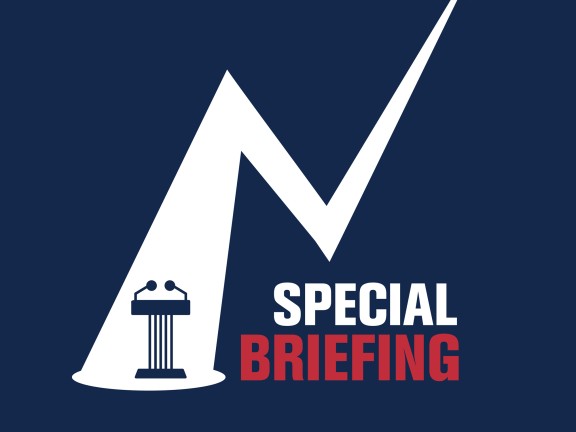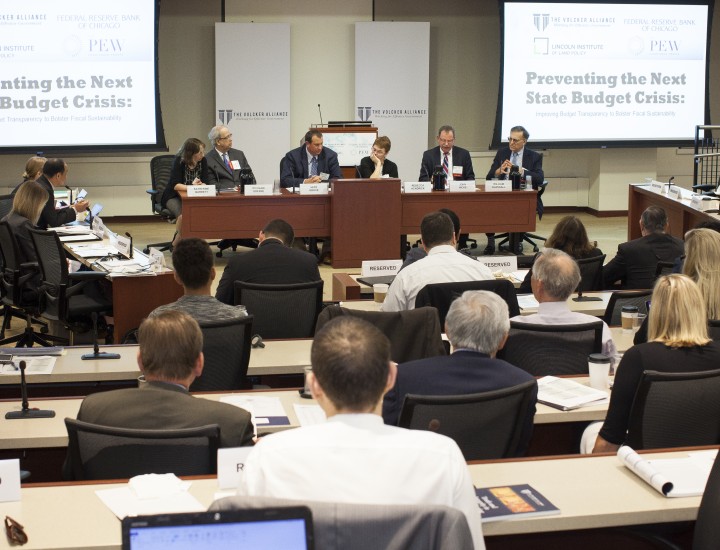Special Briefing: The Future of Mass Transportation as US Pandemic Aid Nears an End

The Volcker Alliance and Penn Institute for Urban Research (Penn IUR) invite you to join an online Special Briefing on the outlook for mass transportation across the US amid waning federal pandemic emergency aid and lagging ridership as metropolitan area commuters continue to work from home. The Special Briefing will include a remembrance of our great friend and colleague, Richard Ravitch, the former New York State lieutenant governor, Metropolitan Transportation Authority chairman, Volcker Alliance director, and tireless advocate for fiscally sustainable state and local budgeting, who passed away on June 25.
Our panel of experts includes Janno Lieber, chair and chief executive officer, Metropolitan Transportation Authority; former US Transportation Secretary Anthony Foxx; Kurt Forsgren, managing director and sector lead for transportation in US Public Finance at S&P Global; Frank Jimenez, senior fiscal policy analyst, California Legislative Analyst's Office; and Leslie Richards, general manager and chief executive officer, Southeastern Pennsylvania Transportation Authority.
Moderated by William Glasgall, Volcker Alliance senior director, public finance and Penn IUR fellow, and Eugenie Birch, co-director of Penn IUR, this briefing is the forty-fourth in a series of sixty-minute online conversations featuring experts from the national research networks of the Volcker Alliance and Penn IUR, along with other leading academics, economists, and federal, state, and local leaders.
Special Briefings are made possible by funding from The Century Foundation, the Volcker Alliance, and members of the Penn IUR Advisory Board.
Recordings of the entire Special Briefings series are available on the Volcker Alliance website: SPECIAL BRIEFING SERIES ARCHIVE.
Be sure to subscribe to the Special Briefing podcast, available on Apple Podcasts, Spotify, Google Podcasts, Stitcher, TuneIn, iHeart Radio and more.
Also, be sure to subscribe to the Volcker Alliance newsletter and Penn IUR newsletter.
Special Briefing Episode Summary:
Transit Agencies Must Rethink Funding, Adapt Services as Pandemic Relief Ends
By Stephen Kleege, Volcker Alliance Special Project Consultant
- Efficiencies, tax increases help New York's MTA sidestep fiscal cliff.
- California transit agencies face $9 billion in shortfalls over five years.
- SEPTA seeks cost savings to offset fiscal cliff of up to $270 million annually.
- S&P sees strong transit credit, has concern about overreliance on fares.
- Technology may enable door-to-door service as transit agencies adapt.
With bus and rail ridership stuck below pre-pandemic levels and billions of dollars of relief money about to expire, US public transit agencies need to rethink funding strategies and adapt services to the post-COVID era, panelists said at a Special Briefing hosted by the Volcker Alliance and Penn Institute for Urban Research.
The July 27 discussion came at “the most urgent time, perhaps, in the history of transit in America,” former US Transportation Secretary Anthony Foxx said. As US pandemic aid nears an end, “we’re seeing a cliff in front of us that can devastate transit agencies all across the country.”
Moderated by William Glasgall, Volcker Alliance senior director, public finance, and Penn IUR fellow, and Eugenie Birch, co-director of Penn IUR, the briefing was the forty-fourth in a series of sixty-minute online conversations featuring experts from the national research networks of the Volcker Alliance and Penn IUR, along with other leading academics, economists, and federal, state, and local leaders.
Panelists paid tribute to Richard Ravitch, the former chairman of New York’s Metropolitan Transportation Agency (MTA) and member of the Volcker Alliance’s board who died in June at age 89. “Dick Ravitch represents everything that everybody on this call is interested in, which is how do we meet the challenges of the moment for mass transit,” said Janno Lieber, current chair and CEO of the MTA. He said Ravitch became one of his “secret weapons,” helping persuade state officials approve a combination of cost efficiencies, increased payroll taxes and casino revenue “to solve the MTA fiscal cliff now, rather than wait for the money to run out.” As a result, he said, the MTA was able to unveil a financial plan for five years with no deficits.
In addition to Lieber and Foxx (who is also an Alliance board member), panelists included Kurt Forsgren, managing director and sector lead for transportation in US Public Finance at S&P Global; Frank Jimenez, senior fiscal policy analyst, California Legislative Analyst's Office; and Leslie Richards, general manager and chief executive officer, Southeastern Pennsylvania Transportation Authority (SEPTA).
While S&P sees the transit sector’s credit as strong, at AA levels, the rating company in January changed its outlook to negative due to “stubbornly slow” ridership improvement from the early days of the pandemic, Forsgren said. He noted “positive actions” in New York, California, and Minnesota, which have provided additional tax support or onetime subsidies.
“We see a tale of two transit operating types,” Forsgren said. “One is those who benefit from significant tax revenues to be able to fund operations. On the other side we have those that really need access to sustainable revenues, which they can’t really control autonomously. They can’t really raise fares, practically or politically, and they don’t have other sources currently at their disposal.”
Jimenez said California’s transit agencies, which received $9.8 billion in federal relief, are estimated to face a statewide funding shortfall of $6 billion over a five-year period. The legislature has approved $5.1 billion in transit funding over four years and provided flexibility in the way agencies can use their money, he said, allowing them to use a $4 billion capital fund for either operations or capital spending. The legislature also created transit task force to come up by with policy recommendations by October 2025 to boost ridership.
Richards said SEPTA’s fiscal cliff will occur when covid relief money runs out in April, 2024, leaving the agency with shortfalls of more than $50 million for the fiscal year and up to $270 million a year after that. SEPTA is working to make up some of the shortfall from state, local, and federal grants. An employee-led efficiency project has found $38 million of annual savings and is expected to increase that to $100 million this year, Richards said. She also said 60,000 area workers are now riding to work for free under a SEPTA program that offers employers discounted fares.
Foxx urged transit agencies to find ways to generate income from local and state sources and to be creative in serving the new generation of customers who are less attached to their cars and more open to mass-transit alternatives. He favors a move toward a more on-demand transit future, using technology and building on paratransit and senior ride models.
“The idea that a transit trip can actually be door to door trip is a pretty radical idea,” Foxx said.

John (“Janno”) Lieber was confirmed as Chair and CEO of the Metropolitan Transportation Authority (MTA) in January 2022, following his nomination to that position by Gov. Kathy Hochul. Lieber has been serving as MTA Acting Chair and CEO since July 2021 and is the Authority’s 15th Chair since it was founded in 1968.
In this position, Lieber provides strategic, financial, and operational leadership for the MTA, the largest public transportation agency in North America. He also heads the MTA Board of Directors, senior leadership team, and a total workforce of more than 60,000 employees.
From 2017 to 2021, Lieber served as President of MTA Construction & Development, the organization responsible for planning, developing, and delivering capital projects across the MTA. In that position, he led the creation and implementation of the MTA’s 2020-2024 $51.5 Billion Capital Program. He also managed the integration and transformation of construction and development management practice at the MTA.
Prior to the MTA, Lieber served as President of World Trade Center Properties LLC, where he was responsible for managing all aspects of the Silverstein organization’s efforts to rebuild at the World Trade Center site, including planning, design, and construction issues; business, financing, and legal matters; and public affairs, government, and community relations.
Earlier in his career, he held positions in the administrations of President Bill Clinton and NYC Mayor Ed Koch and worked as an attorney in private practice.
 Anthony Foxx joined Lyft as chief policy officer and advisor to the president and chief executive officer. Prior to joining Lyft, he served as the seventeenth United States secretary of transportation under President Barack Obama from 2013 to 2017. Mr. Foxx advises AutoTech Ventures, LLC, a Silicon Valley venture capital firm that focuses on surface transportation technology, Hyperloop One, a new transportation technology inspired by Elon Musk and Tullco Investors.
Anthony Foxx joined Lyft as chief policy officer and advisor to the president and chief executive officer. Prior to joining Lyft, he served as the seventeenth United States secretary of transportation under President Barack Obama from 2013 to 2017. Mr. Foxx advises AutoTech Ventures, LLC, a Silicon Valley venture capital firm that focuses on surface transportation technology, Hyperloop One, a new transportation technology inspired by Elon Musk and Tullco Investors.
The Senate confirmed the nomination of Mr. Foxx to the secretary of transportation by a vote of 100-0. During his time as the secretary of transportation, Mr. Foxx led an agency with more than 55,000 employees and a $70 billion budget, whose primary goal was to ensure that America maintains the safest, most efficient transportation system in the world. Under Mr. Foxx’s leadership, the Department of Transportation (DOT) established a first-ever policy framework for the safe integration of self-driving vehicles and leveraged $350 million in public and private funding to demonstrate how smart technology can change cities and local communities.
Mr. Foxx developed the Obama Administration’s first surface transportation bill and worked on a bipartisan basis to get its congressional incarnation, the FAST Act, passed. He launched the Department’s first, and the Administration’s most successful, Smart City Challenge, engaging more than seventy cities to develop their own strategies to incorporate new technologies into their transportation networks.
Previously, he served as the mayor of Charlotte, North Carolina, from 2009 to 2013. First elected to the Charlotte City Council in 2005, upon his 2009 mayoral victory he became the youngest mayor of Charlotte and its second African American mayor. Beginning his tenure as mayor while facing a nearly 13 percent area unemployment rate, Mr. Foxx announced the creation of more than 4,000 new jobs, worked to reinforce Charlotte’s role as a critical energy industry hub, saw the completion of a new runway at Charlotte-Douglas International Airport, and led a delegation of Charlotte business leaders to meet with senior White House officials to press for several economic recovery spending measures.
Mr. Foxx received his bachelor of arts in history from Davidson College and his juris doctorate from the New York University School of Law. He is married to Samara Ryder, also an attorney.
 Kurt Forsgren is a managing director and Sector Leader for Transportation in U.S. Public Finance and also works with S&P’s Global Sustainable Finance Team. Based in Boston, he focuses on credit analysis as a primary analyst while also serving as a credit committee chair, industry researcher and spokesperson on transportation infrastructure as well as climate and environmental, social, governance topics.
Kurt Forsgren is a managing director and Sector Leader for Transportation in U.S. Public Finance and also works with S&P’s Global Sustainable Finance Team. Based in Boston, he focuses on credit analysis as a primary analyst while also serving as a credit committee chair, industry researcher and spokesperson on transportation infrastructure as well as climate and environmental, social, governance topics.
Beginning in S&P Global’s San Francisco office in 1992, Kurt’s experience spans Public Finance and Project Finance, encompassing a variety of sectors. Prior to joining the company, Kurt was a transportation consultant at KPMG.
A member of the National Federation of Municipal Analysts, Boston Municipal Analyst Forum, and Boston Economic Club, Kurt earned a bachelor’s degree in economics and political science from the University of Maine and a Master of Government Administration degree from the Fels Institute of Government at the University of Pennsylvania.

Frank Jimenez is a Senior Fiscal and Policy Analyst at the Legislative Analyst’s Office, a nonpartisan office within the State Legislature. He has spent the past four years covering budget and policy issues related to transportation funding, state highways, and local streets and roads. Frank received a M.A. in Public Policy from the University of Southern California. He also has a B.A. in Political Science from the University of California—Irvine.

Leslie S. Richards is the CEO and 11th General Manager of the Southeastern Pennsylvania Transportation Authority (SEPTA), the sixth largest public transportation agency in the U.S. with a budget of more than $2 billion and a vast network of 9,500 employees that enable the five million residents of the Greater Philadelphia region to connect to each other. SEPTA operates across six transportation modes and has 2,800 vehicles in service, 285 subway and rail stations, 13,000 bus and trolley stops, and 150 routes. Prior to joining SEPTA, Richards was the first woman secretary of the Pennsylvania Department of Transportation (PennDOT), one of the largest and most innovative transportation agencies in the U.S. Richards left a lasting mark on the department by creating strategic solutions for the long-term success of Pennsylvania’s transportation needs through innovative, collaborative programs such as PennDOT Connects.
A staunch advocate for women and diversity in transportation and government, Richards has been recognized for her leadership in the industry and commitment to public service. Prior to her public service, she worked in the private sector as a senior project manager for environmental and civil engineering firms. Richards is a graduate of Brown University, where she concentrated in economics and urban studies. She received a master's of regional planning from the University of Pennsylvania. She lives with her husband in Philadelphia.



